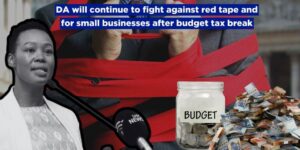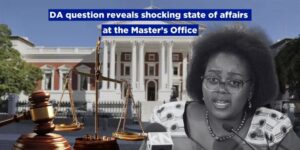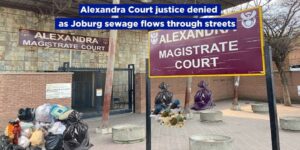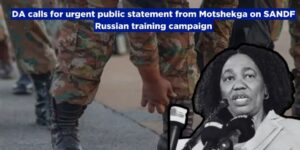Note to editors: Please see below Debate Speech delivered by Siviwe Gwarube MP, in the National Assembly today.
Parliament’s 6th Parliament session is a poor reflection of the institution
Chairperson,
As the sixth Parliament winds down its business, we should take a long and hard look at the work we have done to improve the lives of the South Africans we represent in this House.
- Have we sufficiently held the executive to account?
- Have we championed the issues facing South Africans?
- Have we passed legislation that seeks to solve the problems of our people?
- Have we retained our independence as an institution and remained faithful to those who elected us?
Unfortunately, the answer to all these questions is a resounding: no.
We have not flexed our legislative muscle enough to live up to our oath of office.
Instead, this House has been relegated to being a lap-dog for the government of the day; and not the watch dog for the people.
The statistics speak for themselves.
In the last two terms of Parliament only two Private Members’ Bill have been passed.
This is despite the fact that our core business in Parliament is to pass laws on behalf of the people.
There has been an over-reliance on the Executive to pass legislation; a job that is not theirs.
Chairperson, we are the law-makers.
It is in this context that I table before this House the Constitution 19th Amendment Bill.
Simply put, this Bill seeks to raise the bar when Parliament or the Legislature considers a Motion of no Confidence in a President or a Premier.
If passed, it will limit the frequency and introduce constitutional grounds upon which a motion of no confidence can be heard in a legislature or Parliament.
This is designed to stabilize governance in a national coalition or provincial coalition governments.
It would be catastrophic to see the instability of provincial or a national government in the same way we have seen happen at a local government level.
Chairperson, this legislation would not take away the right of members to be able to hold premiers or the president to account as envisioned in section 102 of the Constitution.
There is a legislative caveat which is important to note.
While a motion of no confidence will be limited to once a year; provision would be made for a removal of a President or Premier if the following conditions are met:
- Serious violation of the Constitution or the law;
- Serious misconduct;
- Inability to perform functions of office
In effect, we are introducing an objective standard for the removal of an office bearer that is similar to section 89 of the Constitution which deals with the impeachment of a head of state.
Why is this an important Bill for South Africa?
One of the problems haunting our people is the instability of local councils in our key metros.
Johannesburg, Ekurhuleni, Nelson Mandela Bay and to a lesser extent Tshwane have been victims of political musical chairs.
They have seen a revolving door of political parties, taking on executive office because of ‘gentlemen’s agreements’ done behind closed doors; in smoked filled rooms.
What has happened in some of these metros has undermined the will of the people and completely bastardised the sacredness of the vote.
This has a direct impact on the quality of services delivered to citizens of these areas.
With every mayor; every motion of no confidence; the removal of the mayoral team we have seen a glaring neglect of the people who look to government for services.
- Rubbish is not collected;
- Traffic lights do not work;
- Crime has acceded unprecedent levels;
- And budgets passed by a previous administration are shafted and new priorities identified.
This is why we have seen the explosion and total collapse of the City of Johannesburg; claiming the lives of over 70 people.
Infrastructure maintenance is never done. It has been neglected for decades.
Motions of no Confidence have been abused for party political reasons.
We have seen people removed for office due to cheque-book politics and not on the basis of concrete constitutional grounds.
This has wreaked havoc in governments such that service delivery has come to a grinding halt.
Mayors, Speakers and whips of council are removed for political reasons and not for governance failures.
Where there have been glaring governance failures, incompetent one-seat parties have been retained because of numbers in council from their unholy alliances.
All this happens while the citizens are the ones who lose out the most.
So while politicians argue about positions in government, people are being killed by disasters that can be avoided.
It does not matter which political party you represent or which constituency you fight for, we can all agree that this instability in our metros cannot continue.
As leaders, we cannot allow for the degeneration of governance in this manner.
That is why it is important to look ahead and prepare now for hung legislatures and a hung Parliament.
The DA has researched; drafted and proposed a raft of bills which will strengthen existing legislation in order to respond to the crisis of unstable governments.
We believe, our role as the official opposition is to offer solutions and lobby for their adoption in this House.
Our democracy is maturing.
It is consolidating in a way that means coalition governments are here to stay.
We need to establish rules of engagement; reconnect with the people that we represent and craft laws that fill the legislative gaps there may exist.
Our constitution and our electoral system were designed to make provision for one -party governance.
They now need to be updated to meet our current reality.
While the crisis in local government continues, as law-makers we must cast our eyes to the looming National and Provincial elections.
We cannot be reactive; and often forced by civil society through court action to prepare for the likely election outcome scenarios we are to see next year.
We should be proactive.
We should be responsive to the shifting political sands.
We should set the way for how we best deal with hung provincial legislatures and possibly a Parliament with no clear majority.
This is why I have brought this legislation before this House.
Making laws is not only a constitutional mandate we have been granted – it is a responsibility we must not take lightly.
We must interrogate the issues facing South Africans and legislate – where necessary – to solve these problems.
We are not a post office for government’s legislation.
We are law-makers. Let us put our political differences aside and get to work.




